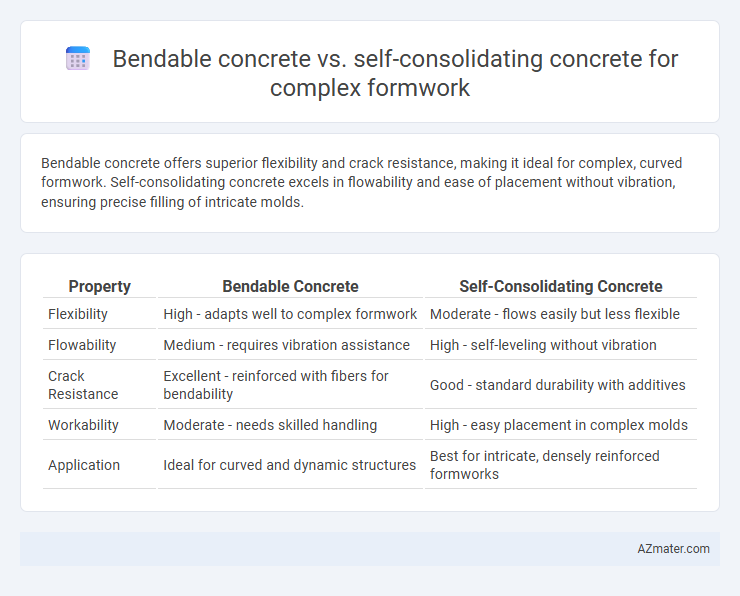Bendable concrete offers superior flexibility and crack resistance, making it ideal for complex, curved formwork. Self-consolidating concrete excels in flowability and ease of placement without vibration, ensuring precise filling of intricate molds.
Table of Comparison
| Property | Bendable Concrete | Self-Consolidating Concrete |
|---|---|---|
| Flexibility | High - adapts well to complex formwork | Moderate - flows easily but less flexible |
| Flowability | Medium - requires vibration assistance | High - self-leveling without vibration |
| Crack Resistance | Excellent - reinforced with fibers for bendability | Good - standard durability with additives |
| Workability | Moderate - needs skilled handling | High - easy placement in complex molds |
| Application | Ideal for curved and dynamic structures | Best for intricate, densely reinforced formworks |
Introduction to Innovative Concrete Types
Bendable concrete offers enhanced flexibility and tensile strength, making it ideal for complex formwork requiring curved or irregular shapes without compromising structural integrity. Self-consolidating concrete, characterized by its high fluidity and non-segregating properties, efficiently fills intricate molds and ensures uniform compaction in complex formwork applications without the need for mechanical vibration. Both innovative concrete types address the challenges of modern architectural designs, optimizing construction efficiency and durability.
Defining Bendable Concrete: Properties and Applications
Bendable concrete, also known as engineered cementitious composite (ECC), features high tensile ductility and crack control due to its fiber-reinforced matrix, allowing it to endure significant deformation without failure, which is ideal for complex formwork requiring flexibility and durability. Self-consolidating concrete (SCC) offers excellent flowability and compaction without mechanical vibration, making it suitable for filling intricate molds but lacking the tensile resilience found in bendable concrete. Applications of bendable concrete include seismic-resistant structures, architectural elements with curved geometry, and infrastructure subjected to dynamic loading, where its crack-tightening ability enhances longevity and performance.
Understanding Self-Consolidating Concrete: Key Features
Self-consolidating concrete (SCC) offers exceptional flowability and segregation resistance, allowing it to fill complex formwork without mechanical vibration. Its key features include high deformability, stability, and the capacity to maintain uniform consistency, which ensures intricate architectural details are accurately rendered. Compared to bendable concrete, SCC excels in ease of placement and surface finish quality for intricate molds, making it ideal for complex formwork applications.
Complex Formwork Challenges in Modern Construction
Bendable concrete excels in addressing complex formwork challenges by offering high tensile strain capacity, reducing the risk of cracking during intricate shaping. Self-consolidating concrete improves formwork adaptability by flowing easily without vibration, ensuring full compaction in tight corners and dense reinforcement areas. Both materials optimize structural integrity and surface finish quality, critical factors in modern construction's demand for complex geometries.
Workability: Bendable vs Self-Consolidating Concrete
Bendable concrete demonstrates superior flexibility and crack resistance, making it ideal for complex formwork requiring high tensile strength and deformation capacity. Self-consolidating concrete offers exceptional flowability and rapid filling of intricate molds without the need for vibration, ensuring precise replication of detailed form shapes. Both materials enhance workability in complex formwork applications, with bendable concrete providing mechanical resilience and self-consolidating concrete excelling in ease of placement and surface finish quality.
Structural Performance in Intricate Molds
Bendable concrete offers superior tensile strength and crack resistance, making it ideal for complex formwork with intricate molds where flexibility and durability are critical. In contrast, self-consolidating concrete excels in flowability and ease of placement, ensuring dense compaction without vibration but may lack the enhanced tensile properties of bendable concrete. Structural performance in intricate molds is optimized by selecting bendable concrete for load-bearing flexibility and self-consolidating concrete for high-quality surface finishes and uniformity.
Cost Implications and Material Efficiency
Bendable concrete, with its enhanced tensile strength and flexibility, reduces the need for extensive reinforcement and formwork adjustments, leading to lower labor and material costs in complex formwork projects. Self-consolidating concrete (SCC) offers superior flowability, minimizing labor costs and formwork pressure but often incurs higher material expenses due to specialized admixtures and mix designs. Material efficiency in bendable concrete stems from its crack-resistant properties, reducing repair costs, while SCC's ability to fill intricate molds accurately reduces waste and rework.
Durability and Longevity Comparison
Bendable concrete, engineered with high tensile strain capacity, offers superior crack resistance and enhanced durability under dynamic loads, making it ideal for complex formwork with flexible shapes. Self-consolidating concrete (SCC) excels in flowability and uniformity without vibration, ensuring precise filling of intricate molds but may exhibit lower tensile strength and higher brittleness compared to bendable concrete. In terms of longevity, bendable concrete's micro-crack control significantly reduces maintenance needs, whereas SCC's durability depends largely on mix design and curing practices within complex formwork environments.
Sustainability and Environmental Impact
Bendable concrete offers enhanced durability and crack resistance, reducing repair frequency and material waste, which contributes to improved sustainability in complex formwork applications. Self-consolidating concrete minimizes energy consumption and labor costs due to its high flowability and excellent filling ability, resulting in less formwork damage and lower carbon footprint during construction. Both materials support sustainable building practices, with bendable concrete excelling in longevity and self-consolidating concrete optimizing resource efficiency.
Choosing the Right Concrete for Complex Formwork Projects
Bendable concrete offers exceptional tensile strength and flexibility, making it ideal for complex formwork involving curved or irregular shapes, reducing the risk of cracking under stress. Self-consolidating concrete provides superior flowability and fills intricate molds without mechanical vibration, ensuring a smooth finish in detailed formwork. Selecting between these concretes depends on project requirements: prioritize bendable concrete for durability in dynamic structures and self-consolidating concrete for precision in highly detailed designs.

Infographic: Bendable concrete vs Self-consolidating concrete for Complex formwork
 azmater.com
azmater.com